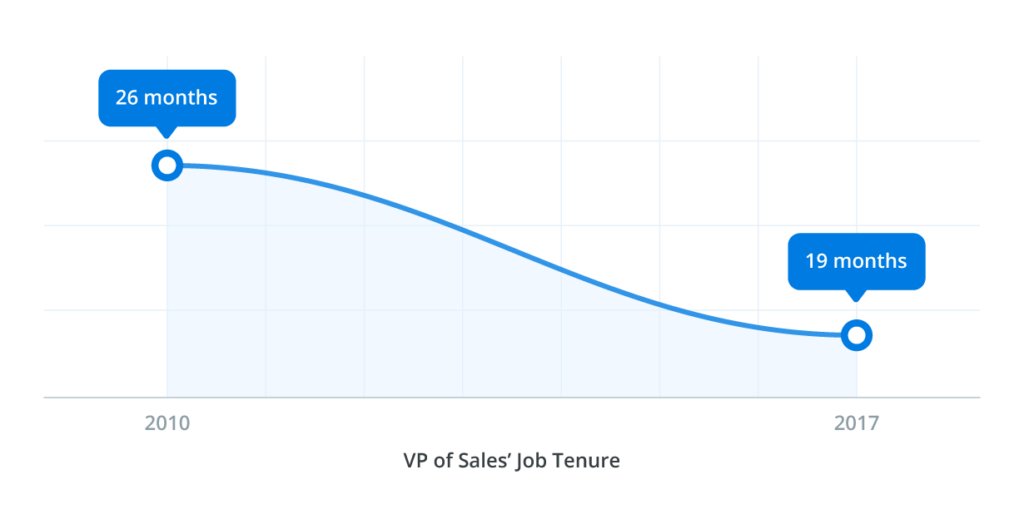Is it your fault if you’re a bad salesperson? Well, it depends. If you’re knowingly in a sales role just for the cash but you don’t really care about solving customer problems, then you’re in the wrong biz. If you’re trying to do right by the customer but you lack the skills and know-how, then it’s likely a management problem. Either way, we’re going to breakdown 11 qualities and characteristics of a bad salesperson.
Some Alarming Stats That Should Make You Wonder…

 The numbers tell it all. Sales target attainment stats disappoint, while over-the-roof turnover rates (especially at the VP of sales level) are sending a staunch rippling effect through the industry. Our friends at Gong.io have done some analysis into this and have called for an investigation into closing the sales performance gap.
The numbers tell it all. Sales target attainment stats disappoint, while over-the-roof turnover rates (especially at the VP of sales level) are sending a staunch rippling effect through the industry. Our friends at Gong.io have done some analysis into this and have called for an investigation into closing the sales performance gap.
Only three out of ten companies see their sales force meet or exceed revenue targets. Roughly 70% miss out.
Meanwhile, staff turnover rates in sales are notoriously high, caused by a range of factors from ambition and high mobility [positives … maybe] to dissatisfaction, poor performance, job mismatch, and disillusionment [negatives … very likely].
But one thing is certain: sales is a tough nut to crack and not everyone is meant to embrace it as a career.
So how do you know if you’re cut out to be a top-notch seller? There have been many books, articles, and seminars detailing the skills, habits, attitudes, and personality traits of highly successful sales practitioners.
But here’s something that takes a different route. On the flip side, some traits and behavior indicate unfitness for a sales role outright, while others can erode your chances of succeeding in the tough, stressful, and competitive world of selling.
The question is, do you show signs of having these characteristics in your system?
11 Characteristics of a Bad Salesperson
- You’re not really into sales.
- You fear rejection and can’t roll with the punches.
- You find yourself as clueless about the product as your customer.
- You love talking so much you forgot to listen.
- You’re unable to ask the right questions.
- You have a sense of entitlement for being so good at what you do.
- Everyone is a prospect.
- You lack genuine social empathy.
- If push comes to shove, you’ll push until the client pushes back.
- You go by gut feel since you distrust science and haven’t embraced technology.
- You focus on products instead of people
1. You’re not really into sales. You’re just doing it because it’s a “job”
You found yourself performing a sales role by chance and you often wonder whether to describe it as pure luck or a cruel stroke of misfortune. The phrase, “there weren’t any better alternatives at the time” often resurfaces every time you explain why you became a sales professional.
Wake up. To be successful in sales, you have to love selling and be proud of your role. Without a passion for sales, you won’t make it very far. Incidentally, if you only care about the money a sales job brings, then people can tell because the value you offer is neither optimal nor genuine, and can only be half-hearted at best.
If you think selling is a negative thing, then it is absolutely not for you.
2. You fear rejection and can’t roll with the punches.
Even the top-performing sales professionals experience tons of rejection. It is what you do after being rejected that counts. If your motivation and energy level always take a nosedive after a failed pitch, ask, or close attempt, then you do not have what it takes to succeed.
People don’t part with money easily. It takes time, strategy and patience to make them see the value in whatever you’re selling. Without grit and calibrated persistence, you won’t close enough deals to make your performance metrics even worth studying.
Quit selling if pressure is not your middle name.
3. You find yourself as clueless about your product as the customer.
This is beyond sad. Nothing can be more embarrassing than being asked a basic question about your product and having no correct answer to give readily.
Success in sales requires a lot of preparation, training, and practice. If you are unwilling to continuously learn new things and prepare for each client engagement, then your failure rate will be higher than the norm.
You can’t rely solely on charm or glibness to close a deal, especially not in the B2B market. Being an excellent sales professional means a lifetime of motivated and active learning.
Lack of appetite for self-improvement is a one-way ticket out of sales.
4. You love talking so much you forgot to listen.
Sales is a communicative process. You need to articulate the value of whatever you are selling. In fact, being a good speaker, presenter, explainer, or communicator is a very big deal in selling.
But sales is also a conversation. And it’s a conversation where customers should do most of the talking! If you monopolize meetings and grab much of the talk-time, you are preventing customers from fully describing where they are coming from, which specific challenges cause them migraines, and which solutions they actually need. While clients do this, your job is to LISTEN.
Obviously, you can force-feed prospects with all the specs in your product line but they won’t thank you for it, much less part with their money.
Forget the coach from Sales Ops. Visit a shrink if you love the sound of your voice too much.
5. You’re unable to ask the right questions.
You think asking questions makes you come off as intrusive. So you’d rather use a map you can’t read than ask for the right directions.
While selling is not exactly a road trip, asking clients the right questions not only gets you closer to your destination (i.,e, making a sale), but also opens up other sweet spots (e.g., upsells, cross-sells, referrals, etc.) just waiting to be revealed down the line.
Asking the right questions is a methodical art that takes time and effort to master. Bad salespeople are unwilling to spend both.
6. You have a sense of entitlement for being so good at what you do.
Businesses depend on sales to survive, grow, and make a positive impact.
But you’re one titanic negative if you think just making the numbers gives you the license to become a showboat and ceaselessly remind people they owe you a lot.
Confidence is a virtue but hubris leads to downfall, in life as well as in sales.
Too much confidence in your charisma, experience, or skills can seed the notion that you don’t need further training or that nothing else can improve your already “peak condition.”
A humble pie now and then can heal delusions of grandeur.
7. Everyone is a prospect.
You tend to think that every name on the CRM is a good prospect to engage. So you head out and cast a wide net, hoping to catch something big … eventually … maybe.
Here are three memos you missed:
- There’s such a thing as lead qualification.
- Spending too much time on bad prospects means losing precious moments for engaging qualified leads instead.
- Engaging only the relevant decision-makers and influencers in a prospect organization works a lot better than chatting with anyone who displays the same company ID.
There’s nothing wrong with being a seller at heart and seeing everyone as a potential customer. That shows you’re a salesperson at the core but it also indicates a gross lack of focus. After all, you are selling a specific product that offers value only to a specific type of customer.
Learn as much as you can about your target audience and never make any groundless assumptions.
8. You lack genuine social empathy.
Selling is a people-centric business and having above-par social skills will help you go further. If you exhibit even borderline antisocial behavior, then sales is not a world you want to be in.
Honestly ask yourself these questions:
- Do you resent negative feedback?
- Do you think everyone in the company is your competition?
- Do you have to “do better” than your colleagues to prove your self-worth?
- Would you rather work alone so you can have a larger share of the pie?
- Do you always find the need to shift employers well before staying a year with a company?
If you find building non-sales relationships difficult, then establishing an authentic connection with clients will not be easy.
9. If push comes to shove, you’ll still push until the client pushes back.
We get it. You’re one passionate seller. So you bombard the client with everything you have as soon as you make contact.
When a client politely declines, you make an instant follow up call or email even before knowing the real reason behind the initial reluctance.
You then launch everything in the sales and marketing arsenal — even stalking the client on social media — to browbeat the prospect into seeing how valuable your product is.
Your energy is impressive but there’s a time and place for everything, as the old saying goes. In many instances, you just need to replace “persistence” (i.e., being pushy) with patience (i.e., strategic downtime) to truly understand the client and steadily, convincingly make the case for your product.
10. You go by gut feel since you distrust science and haven’t embraced technology.
Sure, sales is an art and it ultimately deals with emotion-laden humans, not cold, unfeeling robots. But sales is also a science, a world where metrics and method matter. Gone are the days when instinct and “street experience” alone will help you close deals.
The influence of technology on tomorrow’s business landscape will be far more extensive than it already is today. At the very least, the platforms for conversation as well as the systems for making transactions will be driven by newer and more powerful technologies. More importantly, fresh critical insights on how consumers and markets behave will be discovered and clarified by technological tools.
Simply put, there will be no place for naive Luddites in the sales floors of the future. Knowing how to analyze performance metrics, use sales enablement tools, and harness the entire technology stack will be a competitive advantage for your brand as a sales professional.
11. You focus on products instead of people.
Newsflash – prospects don’t care about raw product features. They care about how those features can solve their problems, and it’s up to you to demonstrate that.
You love your product and have spent hours studying its features, probing its specifications, and memorizing its benefits. You’ve even role-played scenarios where you’ve built custom solutions using the product’s modular elements.
Good thing for you, but selling is also about people. In fact, if you have spent tremendous effort in building your product knowledge, you should spend even more on learning about the specific persons you intend to sell your product to. In case you haven’t noticed, “customer” and “customize” share the same root word. Take that as a cue. Never meet clients without “customizing” your pitch or presentation for their specific context, challenges, or needs.
The writing is on the wall. Business has become more customer-centric over the years that many organizations now have Chief Customer Officers (CCO), customer experience specialists, customer happiness managers, and customer success directors. In sales, the move towards account-based selling (ABS) reflects this paradigm shift.
So go ahead. Love your product. But love the people it will end up with even more.
To be or not to be a bad salesperson
If you found yourself having any of the characteristics outlined above, then you’ve reached a decision box.
You can
a) remain on a path to being a “bad” salesperson;
b) make radical changes in your behavior; or
c) take a different career track.
Sales is tough and not everyone can succeed in it. If you find it difficult to love sales or be proud off a sales role, then your career obviously needs an overhaul. Otherwise, behavioral modification, sales training, and mentorship can help address whatever you lack in skill or outlook.
Nobody’s perfect. But that shouldn’t stop you from getting better and better at what you do.



